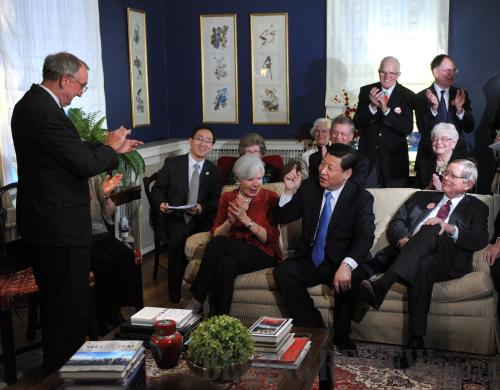|
 |
|
GOOD OLD DAYS: Chinese Vice President Xi Jinping talks with Tom Dvorchak (left), who was his host during his 1985 visit to the U.S. state of Iowa, at a tea reception in Muscatine, Iowa on February 15. Most of the participants were Xi's old acquaintances from his 1985 visit (LIU JIANSHENG) |
During Xi's visit, China and the United States agreed that they would continue to build the Sino-U.S. cooperative partnership, which is significant for the healthy and stable development of relations. They also reached consensus on maintaining close touch between leaders of the two countries. They decided that the fourth round of the Strategic and Economic Dialogue and the second round of Strategic Security Dialogue will be held in China in May. They also will have the third Asia-Pacific affairs consultation in March.
Xi said when meeting Obama that China and the United States should increase strategic trust and respect each other's core interests and major concerns. Obama promised the United States will adhere to the three Sino-U.S. Joint Communiqués and the one-China policy.
The United States "does not support any calls for 'Taiwan independence'," the Xinhua News Agency quoted Obama as saying.
In addition to meeting current U.S. leaders, Xi also talked with former officials. This was a good way to promote political relations, said Jia.
The vice president's visit also pushed bilateral trade and economic cooperation forward, said Jia.
China and the United States released a fact sheet on strengthening economic relations during Xi's visit. The two countries vowed to promote the healthy and steady development of their bilateral cooperative partnership based on mutual respect and mutual benefit. They pledged to promote strong, sustainable and balanced growth of the two countries, cross-border trade and investment and financial sector development and to strengthen international cooperation. According to the sheet, the United States will export more hi-tech products to China and encourage more Chinese enterprises to invest in the United States.
Xi headed a delegation of several hundred Chinese entrepreneurs, who planned to import over $27 billion products from the United States during this tour. Jia pointed out that this reflected China's active attitude to realize a trade balance between the world's two largest economies. Xi also called on the United States to adjust its economic policies and structure to address Sino-U.S. trade imbalances when speaking at a welcoming luncheon hosted by the National Committee on U.S.-China Relations and the U.S.-China Business Council on February 15.
The visit also was a tour to enhance social communication between the two sides, Jia said.
Firestein echoed this view. "A lot of Americans know the name Hu Jintao, but the name Xi Jinping is not well known yet in the United States, and his face is not yet well known," he said. "And I think the public diplomacy aspect of this visit is creating a shaping of perception, helping the American people put a personal face on the Chinese leadership."
The United States is the top power in the world. China, with its growing economic strength, is becoming more influential as the biggest developing country in the world. Today's Sino-U.S. relationship is extremely important.
However, their relationship is under a big test, which is brought by their changing power balance. "U.S. influence is decreasing and China's influence is on the rise. This is the root of current disputes between them," said Jia of the CIIS.
Since 2001, Washington has been focusing on counterterrorism while China has stressed economic development. During the past decade, they have been in a state of "complicated interdependence," said Wang Jisi, Dean of the School of International Studies at Peking University. The international situation has been changing since 2008, when the global financial crisis started. Developed countries, including European nations and the United States, are caught in economic recession. The debt crisis spreading in Europe makes their recovery even slower. While developed countries have stagnated, China has maintained stable development, becoming the second biggest economy in the world.
"The smaller economic gap makes conflicts between China and the United States pop out," said Wang, adding that their conflicts on economic, political and international security issues are getting sharper. China's development makes Washington uneasy, so it decided to "return" to the Asia Pacific and adjusted its military deployment in the region, he said.
| 